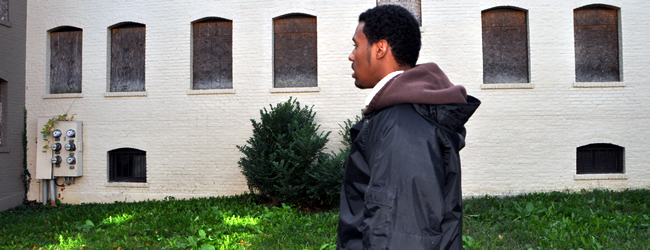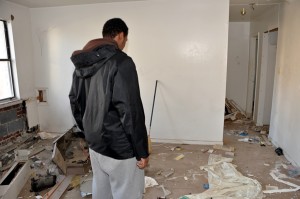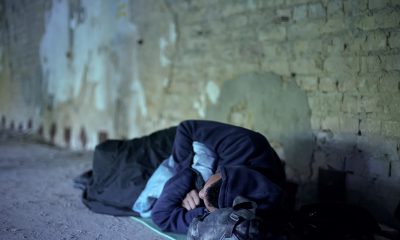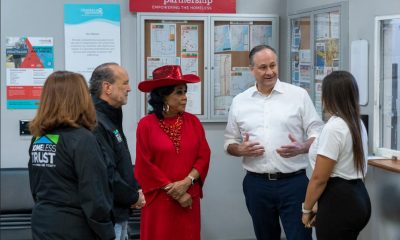Local
Homeless gay teen survives streets, eyes college
Youth lived in D.C. abandoned buildings while on honor roll


Kadeem Swenson says his parents kicked him out of the house for being gay two years ago. He spent a year living in abandoned buildings in D.C. while attending Ballou STAY school. (Washington Blade photo by Michael Key)
Kadeem Swenson looks forward to graduating from D.C.’s Ballou STAY High School in June and is applying for admission to college. He gets good grades and his principal considers him a promising student with a good future.
But the strapping, six-foot-tall 18-year-old, who came out as gay at age 16, says he spent most of the past year hiding a part of his life that became far more difficult to deal with than his sexual orientation.
Forced by his parents to leave his home in Waldorf, Md., two years ago after he told them he’s gay, Swenson stayed with friends and relatives in D.C. and North Carolina for several months. He and his grandmother then prevailed upon his mother to enroll him in Ballou STAY, one of the D.C. public school system’s vocational and academic high schools that offer classes at night.
He stayed at the D.C. home of a student friend and her mother until the family moved to Chicago last year, leaving Swenson without a place to live. Believing a return to his mother and stepfather’s home in Waldorf wasn’t an option, Swenson said he set up residence in abandoned apartment buildings in the city’s Congress Heights section near Ballou.
With some financial support from his grandmother, he managed to get through his junior and part of his senior year at Ballou while hiding the fact that he lived a secret life as a homeless person. He stayed most of the time in a debris-strewn abandoned apartment building a few blocks from his school with no electricity or running water.
“I never really told anybody because I didn’t want anybody to have pity on me,” he said.
In what school officials and LGBT homeless youth advocate Earline Budd call an extraordinary story, Swenson told the Blade how he maintained a positive outlook and an overarching desire to succeed at school under the most trying circumstances.
“I want to go to college and study business,” he said. “And I don’t want to just run a business I want to own it.”
Through the help of one of Ballou’s guidance counselors and its principal, Swenson hooked up last month with Budd and Transgender Health Empowerment, a private, non-profit group that operates the Wanda Alston House for LGBT youth.
Last week, T.H.E. placed Swenson in the Alston House, ending a chapter in his life that he says has made him a stronger person but which also has created “considerable stress.”
“His story is specifically why we opened up the Alston House, because kids are still being put out of their house because they’re gay,” said Brian Watson, T.H.E.’s director of programs.
“And he’s a really good kid. He was going to school despite the fact that he was homeless,” Watson said. “That says a lot about him.”
With the help of one of his Ballou teachers, Swenson says he has applied for admission to Colorado College, a liberal arts school in Colorado Springs, which offers the type of business program he says he’d like to enter. Earlier this year he had an interview with one of the college’s recruiters who came to the D.C. area to talk to local high school seniors.
He showed a Blade reporter and photographer the abandoned building that became his home, leading his guests up a debris-covered stairway to a third-floor, one bedroom apartment with carpeted floors that were well preserved, suggesting the building had only recently been abandoned.
He pointed to the area where he placed a small mat that became his bed. The kitchen and bathroom plumbing fixtures had been ripped out and lay on the floor in the small apartment. The unlocked apartment door was still in place, enabling Swenson to secure a small degree of privacy while staying there.
“I thought a lot about going to college in Colorado and getting away from D.C.,” he said later, recounting his thoughts while huddling at night in the abandoned flat.
Swenson said he followed a routine to get by in his unusual living arrangement. He washed at his school and used the bathrooms at nearby fast food restaurants. He cleaned his clothes at a neighborhood laundry.
He tried to sneak in and out of the abandoned building located on the 100 block of Wayne Place, S.E., through an unlocked outer door out of fear that someone might follow him inside and attack him if he were to be seen entering and leaving.
He occasionally stayed at the homes of men he met at gay bars or clubs, he said, enabling him to take a short leave from the abandoned building. But his visits to the homes of his newfound acquaintances were usually short. And a few older men he met at the clubs made it clear they wanted sexual favors.
“I didn’t want to do that,” Swenson said.
He managed to maintain a cell phone through money he earned in a part-time job as a busboy in a restaurant. But an on-the-job injury from a fall prevented him from continuing to work, he said.
In early October, running low on money and realizing he had reached a point where he might not be able to continue without a safe and more stable place to live, he approached a Ballou administrator and asked for help.
“I just walked to her office and didn’t tell her I’m homeless,” Swenson said. “I told her that my parents kicked me out and I just need somewhere to stay for a little while. I didn’t want to make a big deal out of it.”
In what turned out to be a lucky break, the administrator, Sharon Edwards, knew Earline Budd, the longtime transgender activist who has met with Ballou faculty and administrators on transgender and homeless youth issues.
Budd serves as an outreach official with Transgender Health Empowerment., a D.C. transgender advocacy group that, among other things, provides services to homeless youth who are gay, lesbian and bisexual as well as transgendered.
With the consent of Ballou STAY School principal Wilbert Miller and school guidance counselor Helene Miller, Edwards sent Swenson to T.H.E.’s North Capitol Street offices to meet Budd.
“Miss Edwards gave me a brochure and said I want you to call these people. She said I don’t want you to be offended by the name, Transgender Empowerment, because you don’t have to be transgendered to get services,” Swenson said.
“So I was like, O.K., I’ll go there, and I just went. And when I got there I spoke to somebody else and they introduced me to Miss Budd,” he said. “They said she’ll help you with anything you need help with, and she has.”
Budd, upon meeting Swenson, immediately sprung into action on his behalf, calling city agencies and members of the City Council to help find an emergency youth facility to provide Swenson a place to stay.
“I have a youth in crisis and is age 18, currently homeless to the streets and is sleeping in abandoned buildings,” Budd said in an Oct. 7 e-mail to Council members, city officials and members of the news media.
“I have been working with this youth since Oct. 5, 2010 and he is a very bright young man who deserves more than just talk,” she said in the e-mail. “He is currently enrolled at Ballou Stay, where he is on the honor roll and is said to be in school every day. When asked about his living conditions, he states, ‘Well, I have got to get an education and sleeping in abandoned buildings is not going to kill me.’”
Through Budd’s calls and e-mails, the Sasha Bruce House, a youth shelter in Northeast D.C. near Capitol Hill, arranged to provide Swenson with a room on a temporary basis.
Budd and Watson arranged a short time later for Swenson to be admitted to T.H.E.’s Alston House, which is located in a renovated, multi-bedroom house in Northeast D.C. Swenson moved into the Alston House last week.
Swenson said he hopes to remain in the Alston House until he completes his course work at Ballou in January and enters college in September 2011. He will participate in Ballou’s graduation commencement ceremony in June.
At a reporter’s request, Swenson said he made an attempt to reach his mother through a family friend so the Blade could offer her an opportunity to comment on her son’s plight over the past two years.
“I just talked to my godmother and my godmother got in touch with my mom,” Swenson said. “And she said she doesn’t want any part of this,” he said.
Asked if it was his understanding that his mother did not want to talk to a reporter, Swenson said, “Yeah, that’s right.”
Miller, the Ballou STAY School principal, said he had no idea Swenson was homeless during most of his two-year tenure at the school until Swenson told Edwards about his situation in early October.
“He’s one of our most cordial and interactive students,” Miller said. “He has a great rapport with the staff and the students, and he’s always been interested in college.”
Miller said Ballou STAY High School’s teachers and staff are familiar with LGBT-related issues as they relate to the school system and would have taken immediate steps to help Swenson find a place to live had they known about his homeless status.
“He always looked well groomed,” said Miller. “He said, ‘I took care of my hygiene things before I came to school.’ He said ‘I couldn’t go around looking like I was homeless.’”
Ballou STAY High School shares the same campus but is a separate entity from Ballou Senior High School. Miller said the school system created STAY schools as an alternative educational environment to meet the special needs of a wide range of students at any age who wish to complete high school. The school offers both vocational and academic, college preparatory courses.
He said about half of the students, like Swenson, are between 16 and 18, with many in their 20s and early 30s and others as old as 60. The college-like class system allows students to take as few or as many classes each semester to accommodate their need to work or, in many cases, to raise children, he said.
District of Columbia
Bowser budget proposal calls for $5.25 million for 2025 World Pride
AIDS office among agencies facing cuts due to revenue shortfall

D.C. Mayor Muriel Bowser’s proposed fiscal year 2025 budget includes a request for $5.25 million in funding to support the June 2025 World Pride celebration, which D.C. will host, and which is expected to bring three million or more visitors to the city.
The mayor’s proposed budget, which she presented to the D.C. Council for approval earlier this month, also calls for a 7.6 percent increase in funding for the Mayor’s Office of LGBTQ Affairs, which amounts to an increase of $132,000 and would bring the office’s total funding to $1.7 million. The office, among other things, provides grants to local organizations that provide services to the LGBTQ community.
Among the other LGBTQ-related funding requests in the mayor’s proposed budget is a call to continue the annual funding of $600,000 to provide workforce development services for transgender and gender non-conforming city residents “experiencing homelessness and housing instability.” The budget proposal also calls for a separate allocation of $600,000 in new funding to support a new Advanced Technical Center at the Whitman-Walker Health’s Max Robinson Center in Ward 8.
Among the city agencies facing funding cuts under the mayor’s proposed budget is the HIV/AIDS, Hepatitis, Sexually Transmitted Disease, and Tuberculosis Administration, known as HAHSTA, which is an arm of the D.C. Department of Health. LGBTQ and AIDS activists have said HAHSTA plays an important role in the city’s HIV prevention and support services. Observers familiar with the agency have said it recently lost federal funding, which the city would have to decide whether to replace.
“We weren’t able to cover the loss of federal funds for HAHSTA with local funds,” Japer Bowles, director of the Mayor’s Office of LGBTQ Affairs, told the Washington Blade. “But we are working with partners to identify resources to fill those funding gaps,” Bowles said.
The total proposed budget of $21 billion that Bowser submitted to the D.C. Council includes about $500 million in proposed cuts in various city programs that the mayor said was needed to offset a projected $700 million loss in revenue due, among other things, to an end in pandemic era federal funding and commercial office vacancies also brought about by the post pandemic commercial property and office changes.
Bowser’s budget proposal also includes some tax increases limited to sales and business-related taxes, including an additional fee on hotel bookings to offset the expected revenue losses. The mayor said she chose not to propose an increase in income tax or property taxes.
Earlier this year, the D.C. LGBTQ+ Budget Coalition, which consists of several local LGBTQ advocacy organizations, submitted its own fiscal year 2025 budget proposal to both Bowser and the D.C. Council. In a 14-page letter the coalition outlined in detail a wide range of funding proposals, including housing support for LGBTQ youth and LGBTQ seniors; support for LGBTQ youth homeless services; workforce and employment services for transgender and gender non-conforming residents; and harm reduction centers to address the rise in drug overdose deaths.
Another one of the coalition’s proposals is $1.5 million in city funding for the completion of the D.C. Center for the LGBTQ Community’s new building, a former warehouse building in the city’s Shaw neighborhood that is undergoing a build out and renovation to accommodate the LGBTQ Center’s plans to move in later this year. The coalition’s budget proposal also calls for an additional $300,000 in “recurring” city funding for the LGBTQ Center in subsequent years “to support ongoing operational costs and programmatic initiatives.”
Bowles noted that Bowser authorized and approved a $1 million grant for the LGBTQ Center’s new building last year but was unable to provide additional funding requested by the budget coalition for the LGBTQ Center for fiscal year 2025.
“We’re still in this with them,” Bowles said. “We’re still looking and working with them to identify funding.”
The total amount of funding that the LGBTQ+ Budget Coalition listed in its letter to the mayor and Council associated with its requests for specific LGBTQ programs comes to $43.1 million.
Heidi Ellis, who serves as coordinator of the coalition, said the coalition succeeded in getting some of its proposals included in the mayor’s budget but couldn’t immediately provide specific amounts.
“There are a couple of areas I would argue we had wins,” Ellis told the Blade. “We were able to maintain funding across different housing services, specifically around youth services that affect folks like SMYAL and Wanda Alston.” She was referring to the LGBTQ youth services group SMYAL and the LGBTQ organization Wanda Alston Foundation, which provides housing for homeless LGBTQ youth.
“We were also able to secure funding for the transgender, gender non-conforming workforce program,” she said. “We also had funding for migrant services that we’ve been advocating for and some wins on language access,” said Ellis, referring to programs assisting LGBTQ people and others who are immigrants and aren’t fluent in speaking English.
Ellis said that although the coalition’s letter sent to the mayor and Council had funding proposals that totaled $43.1 million, she said the coalition used those numbers as examples for programs and policies that it believes would be highly beneficial to those in the LGBTQ community in need.
“I would say to distill it down to just we ask for $43 million or whatever, that’s not an accurate picture of what we’re asking for,” she said. “We’re asking for major investments around a few areas – housing, healthcare, language access. And for capital investments to make sure the D.C. Center can open,” she said. “It’s not like a narrative about the dollar amounts. It’s more like where we’re trying to go.”
The Blade couldn’t’ immediately determine how much of the coalition’s funding proposals are included in the Bowser budget. The mayor’s press secretary, Daniel Gleick, told the Blade in an email that those funding levels may not have been determined by city agencies.
“As for specific funding levels for programs that may impact the LGBTQ community, such as individual health programs through the Department of Health, it is too soon in the budget process to determine potential adjustments on individual programs run though city agencies,” Gleick said.
But Bowles said several of the programs funded in the mayor’s budget proposal that are not LGBTQ specific will be supportive of LGBTQ programs. Among them, he said, is the budget’s proposal for an increase of $350,000 in funding for senior villages operated by local nonprofit organizations that help support seniors. Asked if that type of program could help LGBTQ seniors, Bowles said, “Absolutely – that’s definitely a vehicle for LGBTQ senior services.”
He said among the programs the increased funding for the mayor’s LGBTQ Affairs office will support is its ongoing cultural competency training for D.C. government employees. He said he and other office staff members conduct the trainings about LGBTQ-related issues at city departments and agencies.
Bowser herself suggested during an April 19 press conference that local businesses, including LGBTQ businesses and organizations, could benefit from a newly launched city “Pop-Up Permit Program” that greatly shortens the time it takes to open a business in vacant storefront buildings in the downtown area.
Bowser and Nina Albert, D.C. Deputy Mayor for Planning and Economic Development, suggested the new expedited city program for approving permits to open shops and small businesses in vacant storefront spaces could come into play next year when D.C. hosts World Pride, one of the word’s largest LGBTQ events.
“While we know that all special events are important, there is an especially big one coming to Washington, D.C. next year,” Bowser said at the press conference. “And to that point, we proposed a $5.25 million investment to support World Pride 2025,” she said, adding, “It’s going to be pretty great. And so, we’re already thinking about how we can include D.C. entrepreneurs, how we’re going to include artists, how we’re going to celebrate across all eight wards of our city as well,” she said.
Among those attending the press conference were officials of D.C.’s Capital Pride Alliance, which will play a lead role in organizing World Pride 2025 events.
Maryland
Health care for Marylanders with HIV is facing huge cuts this summer
Providers poised to lose three-quarters of funding

BY MEREDITH COHN | By the end of June, health care providers in Maryland will lose nearly three-quarters of the funding they use to find and treat thousands of people with HIV.
Advocates and providers say they had been warned there would be less money by the Maryland Department of Health, but were stunned at the size of the drop — from about $17.9 million this fiscal year to $5.3 million the next. The deep cuts are less than three months away.
The rest of this article can be read on the Baltimore Banner’s website.
District of Columbia
Taste of Point returns at critical time for queer students
BIPOC scholar to speak at Room & Board event on May 2

The Point Foundation will kick off May with its annual Taste of Point DC event. The event will be hosted at Room & Board on 14th Street and feature a silent auction, food tastings, a speech from a scholar, and more.
Point’s chief of staff, Kevin Wright, said that at Taste of Point, the scholars are the star of the show.
“People never come to an event to hear Point staff speak, they come to hear from the people most impacted by the program,” he said. “At its core Taste of Point is designed to center and highlight our scholars’ voices and experiences.”
This year, a Point BIPOC Scholar, Katherine Guerrero Rivera will speak at the event.
“It is a great opportunity to highlight the scholars out there on the front lines making impacts in almost every sector and job field,” Wright said.
Wright pointed out that this year especially is a pivotal time for LGBTQ students.
“In 2023, there were 20 states that passed anti-LGBTQ legislation,” he said. “By this point in [2024] we already have more.”
Wright said the impacts of those legislative attacks are far reaching and that Point is continuously monitoring the impact they have on students on the ground.
Last month, The Washington Post reported that states with anti-LGBTQ laws in place saw school hate crimes quadruple. This report came a month after a non-binary student, Nex Bennedict, died after being attacked at school.
“So, we see this as a critical moment to really step up and help students who are facing these challenges on their campus,” Wright said. “Our mission is to continue to empower our scholars to achieve their full academic and leadership potential.”
This year Point awarded nearly 600 LGBTQ students with scholarships. These include the flagship scholarship, community college scholarship and the BIPOC scholarship. When the foundation started in 2002, there were only eight scholarships awarded.
Dr. Harjant Gill is one of those scholars who said the scholarship was pivotal for him. Gill said he spent his undergraduate years creating films and doing activism for the LGBTQ community.
As a result, his academic record wasn’t stellar and although he was admitted into American University’s graduate program he had no clue how he would fund it.
Upon arrival to American he was told to apply for a Point scholarship and the rest was history.
“It ended up being the one thing that kept me going otherwise I would have dropped out,” he said. “Point was incredibly instrumental in my journey to becoming an academic and a professor.”
More than a decade later, Gill serves on the host committee for Taste of Point and is a mentor to young Point scholars. He said that he donates money yearly to Point and that when he is asked what he wants for a gift he will often tell his friends to donate too.
To attend the event on Wednesday, May 2, purchase tickets at the Point website. If you can’t attend this year’s Taste of Point DC event but would like to get involved, you can also donate online.




















